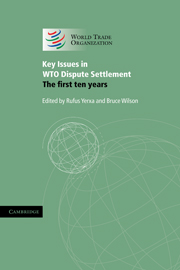Book contents
- Frontmatter
- Contents
- Notes on contributors
- Preface
- Table of cases
- Abbreviations
- PART I Introduction and General Considerations
- PART II The WTO Dispute Settlement System: Its Processes and Its Institutions
- 3 The WTO dispute settlement system and its operation: a brief overview of the first ten years
- 4 The role of the Dispute Settlement Body in the dispute settlement process
- 5 Consultations and the panel process in the WTO dispute settlement system
- 6 Contingent trade remedies and WTO Dispute Settlement: some particularities
- 7 The making of the ‘World Trade Court’: the origins and development of the Appellate Body of the World Trade Organization
- 8 Special challenges at the appellate stage: a case study
- 9 The reasonable period of time for compliance with rulings and recommendations adopted by the WTO Dispute Settlement Body
- 10 Implementation of panel and Appellate Body rulings: an overview
- 11 A brief introduction to countermeasures in the WTO dispute settlement system
- PART III The WTO Dispute Settlement System: Systemic and Other Issues
- PART IV Annexes
7 - The making of the ‘World Trade Court’: the origins and development of the Appellate Body of the World Trade Organization
from PART II - The WTO Dispute Settlement System: Its Processes and Its Institutions
Published online by Cambridge University Press: 04 August 2010
- Frontmatter
- Contents
- Notes on contributors
- Preface
- Table of cases
- Abbreviations
- PART I Introduction and General Considerations
- PART II The WTO Dispute Settlement System: Its Processes and Its Institutions
- 3 The WTO dispute settlement system and its operation: a brief overview of the first ten years
- 4 The role of the Dispute Settlement Body in the dispute settlement process
- 5 Consultations and the panel process in the WTO dispute settlement system
- 6 Contingent trade remedies and WTO Dispute Settlement: some particularities
- 7 The making of the ‘World Trade Court’: the origins and development of the Appellate Body of the World Trade Organization
- 8 Special challenges at the appellate stage: a case study
- 9 The reasonable period of time for compliance with rulings and recommendations adopted by the WTO Dispute Settlement Body
- 10 Implementation of panel and Appellate Body rulings: an overview
- 11 A brief introduction to countermeasures in the WTO dispute settlement system
- PART III The WTO Dispute Settlement System: Systemic and Other Issues
- PART IV Annexes
Summary
Introduction
The Appellate Body of the World Trade Organization (WTO) heard and decided its first appeals case in 1996. By 1 January 2005, the Appellate Body had heard and decided 64 appeals from WTO panel reports. The body of case law generated by the Appellate Body over the past nine years is, both in quantitative and qualitative terms, impressive. The Appellate Body's case law is highly authoritative and has made a significant contribution to the development of international trade law. The decisions of the Appellate Body in, for example, US – Shrimp and EC – Asbestos, have effectively put an end to complex and sensitive disputes between WTO Members. Both panels and parties in WTO disputes have shown, and continue to show, much deference to the case law of the Appellate Body. The Appellate Body is undisputedly the most important organ of WTO dispute settlement. The Appellate Body is, all but in name, the ‘World Trade Court’. The key question addressed in this article is: what explains the prominent status, which the Appellate Body and its case law have achieved since 1996? Was the ‘success’ of the Appellate Body and its emergence as the World Trade Court ‘predetermined’ by its constituent instruments or is it primarily the result of other factors that have affected the Appellate Body and its case law in the past nine years?
- Type
- Chapter
- Information
- Key Issues in WTO Dispute SettlementThe First Ten Years, pp. 63 - 79Publisher: Cambridge University PressPrint publication year: 2005
- 2
- Cited by



